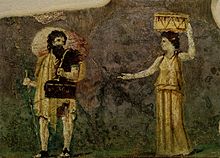Hipparchia
Hipparchia ( Ίππαρχἰα , * around 340 BC in Maroneia in Thrace ) was a follower of the Cynical philosophy .
Hipparchia came from a wealthy family in Thrace and was the sister of Metrokles . She married Krates von Thebes , one of the most important representatives of the Cynics, and adopted the corresponding lifestyle, which, according to the Cynic ideas, was characterized by lack of needs and closeness to nature.
Hipparchia fought for the right of women to self-determination and education. Diogenes Laertius reports of a dispute between her and the philosopher Theodoros, in which she affirmed her right to study philosophy.
Exact information about her life is rare and often overgrown by later legends. As a cynic, she was often said to have followed a shameless lifestyle. For example, the Christian church father Augustine rumored that Hipparchia had sexual intercourse with Krates in public as well, since both were of the opinion that conventions and public opinion were of no importance for personal action and that it therefore made no difference whether an act was private or in being carried out to the public.
Krates designed the marriage as a difficult test of whether she was also ready to share his "doggy" life with him:
According to tradition, Hipparchia was a distinguished young lady from a wealthy family, for whom younger and richer applicants sought. When she insisted on marrying the Krates, he bared his hunched back in front of her and laid his satchel with his stick and robe on the floor: “This is my belongings, and you've seen how beautiful I am. So think about it carefully so that you don't have reason to complain afterwards ”. But she was not deterred. “I couldn't find a richer, more beautiful husband in the whole world; you can lead me wherever you want. "
Then he led her to the portico, and there, in this crowded place, in broad daylight, he lay down next to her and would have deflowered her in front of everyone - she was as composed as he - if Zenon had not quickly thrown his cloak over her, to protect them from the gawking crowd around them.
Source translation
- Georg Luck (ed.): The wisdom of dogs. Texts of the ancient Cynics in German translation with explanations (= Kröner's pocket edition . Volume 484). Kröner, Stuttgart 1997, ISBN 3-520-48401-3 , pp. 218-220.
literature
Overview display
- Jesús María García González, Pedro Pablo Fuentes González: Hipparchia de Maronée. In: Richard Goulet (ed.): Dictionnaire des philosophes antiques . Volume 3, CNRS Éditions, Paris 2000, ISBN 2-271-05748-5 , pp. 742-750
Investigations
- Flavio Baroncelli, Walter Lapini: Ipparchia, di Maronea, sorella di Metrocle Cinico, sposa di Cratete Tebano, e il perfido Teodoro. In: Maia 53, 2001, pp. 635-642
- Udo Hartmann : Cynical border crossings. The Greek philosopher Hipparchia. In: Elke Hartmann, Udo Hartmann, Katrin Pietzner (eds.): Gender definitions and gender borders in antiquity , Stuttgart 2007, pp. 229–246
Web links
- Laura Grams: Entry in the Internet Encyclopedia of Philosophy .
| personal data | |
|---|---|
| SURNAME | Hipparchia |
| ALTERNATIVE NAMES | Ίππαρχἰα |
| BRIEF DESCRIPTION | Follower of the Cynical philosophy school |
| DATE OF BIRTH | around 340 BC Chr. |
| DATE OF DEATH | 4th century BC BC or 3rd century BC Chr. |
